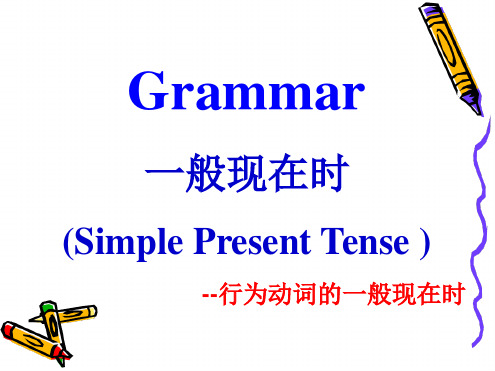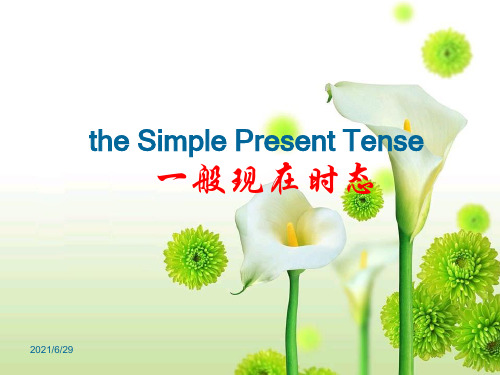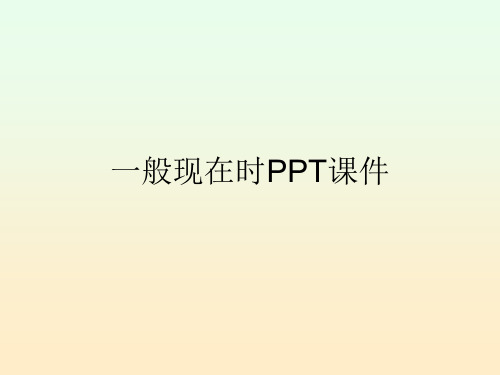初中英语语法中的一般现在时PPT课件
合集下载
七年级英语一般现在时PPT课件.ppt

7. I often __p_l_a_yfootball at weekends. (play) 8. Simon's father often __w__a_t_cfhooetsball games on
TV. (watch)
9. Millie __r_e_a_d_ sbooks at home. (read)
2、连系动词 例句:He is ten years old .
I feel happy .
3、助动词 例句:Do you have a sister?
He doesn't speak English.
4、情态动词
例句:We must go now.
She can speak English.
一般现在时的构成:
My name is Amy. He is ten years old.
---be动词的一般现在时。 I often play football after school.
He watches TV every day. -----行为动词的一般现在时
动词的种类
行为动词的一般现在时的构成:(看例句并总结规律, 注意观察红色和蓝色字体。) 1、I play football every day . 2、You play football every day . 3、My friends play football every day . 4、He plays football every day . 5、Tom plays football every day . 6、My brother plays football every day . 总结规律: 当主语是第一、第二人称和第三人称复数时,行为动 词使用其原形。当主语是第三人称单数时,行为动词 使用其第三人称单数形式。 行为动词一般现在时的第三人称单数形式
初中英语一般现在时学习课件(共25张ppt)

let?schant系动词be的一般现在时实义行为动词的一般现在时一系动词be的一般现在时1肯定句的构成
一般现在时 The simple present tense
Let's chant
Like,like, what do you like? Running, running, I like running. Like, like, what does he like? Swimming, swimming, he likes swimming. Like, like, what does she like? Fishing, fishing, she likes fishing.
二、一般现在时的构成
系动词be的一般现在时 实义(行为)动词的一 般现在时
• (一)、系动词be的一般现在时
1、肯定句的构成: 主语 + be + 其他
The girl is my friend.
2.be动词包括哪些 ?
am is are 什么时候用is? 什么时候用am? 什么时候用are?
be 的用法口诀 我用am,你用are, is连着他,她,它; 单数名词用is, 复数名词全用are。
4. He always_______(wash) clothes at 7:00.
5. They ______ (watch) TV on Sundays.
6. Miss Li_______ (teach) Chinese. 1. Look at the animal, it ____(have) four legs.
Exercise
• • • • • • • 1、Kitty ( ) an English girl. 2、We ( ) students. 3、I ( ) from Taizhou. 4、She ( ) tall. 5、Lucy and Lily ( ) good friends. 6、Those chairs ( ) broken. 7、The bag ( ) mine.
一般现在时 The simple present tense
Let's chant
Like,like, what do you like? Running, running, I like running. Like, like, what does he like? Swimming, swimming, he likes swimming. Like, like, what does she like? Fishing, fishing, she likes fishing.
二、一般现在时的构成
系动词be的一般现在时 实义(行为)动词的一 般现在时
• (一)、系动词be的一般现在时
1、肯定句的构成: 主语 + be + 其他
The girl is my friend.
2.be动词包括哪些 ?
am is are 什么时候用is? 什么时候用am? 什么时候用are?
be 的用法口诀 我用am,你用are, is连着他,她,它; 单数名词用is, 复数名词全用are。
4. He always_______(wash) clothes at 7:00.
5. They ______ (watch) TV on Sundays.
6. Miss Li_______ (teach) Chinese. 1. Look at the animal, it ____(have) four legs.
Exercise
• • • • • • • 1、Kitty ( ) an English girl. 2、We ( ) students. 3、I ( ) from Taizhou. 4、She ( ) tall. 5、Lucy and Lily ( ) good friends. 6、Those chairs ( ) broken. 7、The bag ( ) mine.
(完整版)一般现在时课件

一般疑问句: Be+主语+表语?
Are your parents doctors? Yes, they are./No, they aren’t. Is Mr Long 28 years old? Yes, he is./No, he isn’t.
2021:表示行为动作的词语
3. 经常、习惯、反复做的事情 We have lunch at 12:30. We go to school on Monday.
2021/6/29
be 动词的一般现在时:
be: am, is, are
用be动词的适当形式填空: I ‗a‗m‗‗ he‗‗is‗‗ she ‗i‗s‗‗
iti‗s‗‗‗ Tomis‗‗‗‗
否定句:
☺主语(I/We/You/They)+do+ not+动词原形+其他 I don’t watch TV on Sunday. ☺主语(He/She/It)+does +not+动词原形+其他 He doesn’t watch TV at home on Sunday.
2021/6/29
Practice:
5. 特殊情况 have– has
把下面的行为动词变为第三人称单数形式:
go―goes
carry―carries ride―rides
open―opens
have ― has
teach―teaches brush― brushes dey―deys
play―plays
finish―finishes
2021/6/29
1.一般情况直接加s e.g. reads, plays, works, makes
《一般现在时讲解》课件

一般现在时可以用来描述当前的情况或状态,例如“我现在很开心”、“她现在 是一名学生”等。这种时态强调的是当前的情况或状态,而不是过去或未来的变 化。
表示客观事实或普遍真理
总结词
描述不受时间影响的客观事实或普遍真理。
详细描述
一般现在时可以用来描述不受时间影响的客观事实或普遍真理,例如“地球是圆的”、“水在100摄氏度下沸腾 ”等。这种时态强调的是事实的普遍性和客观性,不会因为时间而改变。
I eat an apple every day. (我每天吃 一个苹果。)
结构
一般现在时的基本结构是“主语+谓 语+(宾语)+(其他成分)”,其中 谓语动词以原形或第三人称单数形式 出现。
一般现在时的特点
01
02
03
强调现在
一般现在时强调当前时间 点,表示动作或状态正在 发生或存在。
普遍性
一般现在时用于描述普遍 存在的真理、事实或习惯 性行为,不受时间限制。
总结词
动词形式不同
详细描述
一般现在时的动词形式为原型,而一般将 来时的动词形式需要用will+动词原型。
与现在进行时的对比
总结词
动作状态不同
详细描述
一般现在时表示现在的动作或状态,强调动作的持续性 ;而现在进行时表示正在进行的动作或状态,强调动作 的进行过程。
总结词
用法侧重不同
详细描述
一般现在时更侧重于描述习惯性、经常性的动作或状态 ,而现在进行时则侧重于描述当前正在发生的动作或状 态。
一般现在时的用法
表示习惯性或经常发生的动作
总结词
描述日常生活中的常见行为或习惯。
详细描述
一般现在时用于描述日常生活中的常见行为或习惯,例如“我每天早上起床” 、“他每周去健身房锻炼”等。这种时态强调行为的频繁性或习惯性,而不是 特定的一次性事件。
表示客观事实或普遍真理
总结词
描述不受时间影响的客观事实或普遍真理。
详细描述
一般现在时可以用来描述不受时间影响的客观事实或普遍真理,例如“地球是圆的”、“水在100摄氏度下沸腾 ”等。这种时态强调的是事实的普遍性和客观性,不会因为时间而改变。
I eat an apple every day. (我每天吃 一个苹果。)
结构
一般现在时的基本结构是“主语+谓 语+(宾语)+(其他成分)”,其中 谓语动词以原形或第三人称单数形式 出现。
一般现在时的特点
01
02
03
强调现在
一般现在时强调当前时间 点,表示动作或状态正在 发生或存在。
普遍性
一般现在时用于描述普遍 存在的真理、事实或习惯 性行为,不受时间限制。
总结词
动词形式不同
详细描述
一般现在时的动词形式为原型,而一般将 来时的动词形式需要用will+动词原型。
与现在进行时的对比
总结词
动作状态不同
详细描述
一般现在时表示现在的动作或状态,强调动作的持续性 ;而现在进行时表示正在进行的动作或状态,强调动作 的进行过程。
总结词
用法侧重不同
详细描述
一般现在时更侧重于描述习惯性、经常性的动作或状态 ,而现在进行时则侧重于描述当前正在发生的动作或状 态。
一般现在时的用法
表示习惯性或经常发生的动作
总结词
描述日常生活中的常见行为或习惯。
详细描述
一般现在时用于描述日常生活中的常见行为或习惯,例如“我每天早上起床” 、“他每周去健身房锻炼”等。这种时态强调行为的频繁性或习惯性,而不是 特定的一次性事件。
一般现在时ppt课件完整版

不可数名词作主语时,谓语动词用单数 形式。
可数名词单数作主语时,谓语动词也用 单数形式。
例如:Water is essential for life.(水 对生命至关重要。)/ A book is on the table.(一本书在桌子上。)
例外情况总结
当主语为并列主语时,谓语动词的数要与靠近它的主语保持一致。
练习3答案
reads。解析:主语 She 是第三人称单数 ,且时间状语为 on weekends,表示经 常性动作,所以谓语动词要用单数形式 reads。
THANKS
时间状语分类及举例
表示经常性或习惯性的动作
always, usually, often, sometimes
表示现在的状态或特征
now, at present, these days
表示普遍真理或客观事实
in general, as a rule
频率副词分类及举例
01
高频副词
always, constantly, continually
注意区分完全否定和部分否定。完全 否定表示全部否定,而部分否定表示 部分否定。例如,“None of the students passed the exam.”(没 有一个学生通过了考试)是完全否定 ;“Not all of the students passed the exam.”(并非所有学生都通过 了考试)是部分否定。
does he work?等。
动词短语和情态动词的变化规则
03
动词短语中的动词和情态动词后接动词原形,如I can swim,
they often go out等。
02 肯定句结构与用法
主语+动词原形+其他成分
(完整版)一般现在时PPT课件.ppt

7. Tom can not walk fast because he _c_a_r_r_ie_s(carry) a heavy box.
用动词的适当形式填空
1.She ____(go) to school at eight o’clock.
2. He usually _____ up at 17:00.(get )
直接加s
Fly-flies;ห้องสมุดไป่ตู้stay-stays
• 第三节 • 特殊疑问句
• I clean the window at home on Saturdays.
• 1、对主语提问:
• Who cleans the window at home on Saturdays?
• 2、对宾语提问:
Has David got a goal?
7. We have four lessons.(否定句) We don’t have four lessons.
8. Nancy doesn’t run fast (肯定句)
Nancy runs fast. 9. My dog runs fast. 否定句:My dog doesn’t run fast.
5. Danny_s_t_u_d_ie_s__(study) English, Chinese, Maths, Science and Art at school.
6. Mike sometimes g_o__e_s_(go) to the park with his sister.
7. At eight at night, she w__a_tc_hes (watch) TV with his parents. 8. _D_o_e_s_ Mike r_e_a_d_(read) English every day?
初中一般现在时ppt

句型转换 1.My brother works in Shenzhen. ______ ______ your brother ________? 2.One of my classmates comes from Australia. ______ ______ one of your classmates______ _______? 3.He does his homework every day.(否定句) He _______ _______ his homework every day. 4.David wants to see me. _______ ______ David _______ to see? 5.She teaches English in No.8 Middle School. ________ ______ she _______ English? 6.My parents live in Chongqing now. ________ live in Chongqing now? 7.They look very young.(一般疑问句) ______ they _______ very young?
2.实义动词的一般现在时句式:
肯定句:
主语(I/We/You/They)+v.+其他
e.g. We study in a high school.
They have a pet.
否定句:
主语(I/We/You/They)+do+ not+v.+其他
They don’t have a pet.
is
to drink
looks
doesn’t do
doesn’t like
七年级一般现在时课件PPT

示例
Do you like apples? 你喜 欢苹果吗?
Am/Is/Are引导的一般疑问句
01
结构
Am/Is/Are + 主语 + 其他?
02
用法
用于询问对方或第三方的身份、特征或状态,其中Am用于第一人称单
数,Is用于第三人称单数和不可数名词,Are用于其他人称和复数。
03
示例
Are they your friends? 他们是你的朋友吗?
用所给动词的适当形式填空
2. My father _______ (work) in a bank. He _______ (go) to work by bus every day.
07
总结回顾与拓展延伸
重点内容回顾
01
02
03
04
一般现在时的定义:表示经常 性、习惯性或普遍性的动作或 状态,以及客观真理或事实。
示例与练习
示例
What do you usually do on weekends? 你周末通常做什 么?
练习
根据所给情境,构造特殊疑问句并给出相应回答。例如,针 对“我昨天去了图书馆”这一情境,可以构造特殊疑问句 “Where did you go yesterday?”并回答“I went to the library yesterday.”。
示例与练习
示例:将陈述句“He likes
playing basketball.”改为一
般疑问句。
01
答案:Does he like playing
basketball?
02
练习:将以下陈述句改为一般
疑问句。
03
She has a new bike.
- 1、下载文档前请自行甄别文档内容的完整性,平台不提供额外的编辑、内容补充、找答案等附加服务。
- 2、"仅部分预览"的文档,不可在线预览部分如存在完整性等问题,可反馈申请退款(可完整预览的文档不适用该条件!)。
- 3、如文档侵犯您的权益,请联系客服反馈,我们会尽快为您处理(人工客服工作时间:9:00-18:30)。
•2 One of the boys_____ a black hat.
B A have B there is C there are D has
B •3 We will go shopping if it____ tomorrow.
A don't rain Bdidn't rain Cdoesn't rain Disn't rain
the afternoon .
二、单三人称形式易出错
1、 He pplalaieys (play) football very well.
以辅音字母加y结尾的动词变单三人称形式 才能把y换成i再加es; 2 、Danny ggooess (go) to school at 7:10.
与名词变复数不同,变单三人称形式以o结 尾的词要加es.
Danny is a good student. Danny isn’t a good student. Is Danny a good student?
学生常见错误如下:
一、be动词与行为动词同时 出现在句子中 二、单三人称形式易出错 三、在句式变换时易出错
四、对do的理解易出错
五、对主语的数判断有误
• Brian doesn’t lilvivees (not live) in China.
• 单三人称做主语的一般现在时做句 式变化时,可记住如下口诀:“见 助动,用原形”。此口诀也可推广 用于一般过去时态中。e.g. He didn't go home yesterday.
四、对பைடு நூலகம்o的理解易出错
• They don’t have lunch at 12:00.
Do they have lunch at 12:00?
• Jenny doesn’t speak English very well.
Does Jenny speak English very well?
含有be动词的要在be上做变化.
study-studies fly-flies
• 不规则变化 have-has
• 给出下列单词的第三人称单数形式
• play buy miss
go hurry teach see wash walk watch come say
三、在句式变换时易出错
• Does Jenny hhaavse (has) a good friend?
一、be动词与行为动词同时出现 在句子中
B •(一)、 单选 •1 Jenny ____ in an office. Her parents ____in a hospital.
D A work; works B works; work C work; are C working D is working; work
一般现在时第三人称单数的构成
• 规则变化
• 一般情况下直接+s
work-works ask-
asks see-sees
• 以s, x, ch, sh, o 结尾+es watch-watches go-
goes do-does wash-washes
• 以辅音字母+y结尾,变y为i加es try-tries
B •4 He said the sun ____in the east and ____in
the west.
A rose; set B rises; sets C rises, set D rise; sets
(二)、填空
1 I can take Li Ming there when he _c_o_m_e_s ( come) to visit. 2 _D_o_e_s_your sister_k_n_o_w_(know)English? 3Her home___is_ _a_w__a_y _f_ro_m___(远离 )her school.
4The pot doesn`t look (not look) like yours very
much. 5 Where __d_o__you _h_a_v_e (have)lunch every day? 6 Who _w_a_n_t_s(想要 )to go swimming? 7 __D_o_e_s_she__d_o__(do) the housework every day? 8 Jenny and Danny usually__p_l_ay__(play) games in
3)表示客观真理 e.g. There are seven days in a week.
The moon moves round the earth.
其时间状语为often、 usually、 always、 sometimes等频率副词,on Saturdays、 in the morning(afternoon, evening) 、 every day 等。
• 1)表示动作,一般人称 作主语的,变否定句
须在动词前加助动词 don’t;变一般疑问句须 在句首加助动词do。
• 2)三单人称做主语的, 变否定句须在动词前 加助动词doesn’t;变一 般疑问句须在句首加 助动词does。
• e.g. They have lunch at 12:00.
• e.g. Jenny speaks English very well.
初中英语语法中的一般现在时
一般现在时是英语中应用最广泛的 时态之一,是初中英语语法重点。
它表示
1)经常性、习惯性的 动作或存在的状态。 e.g. I go to school on foot.
He is very busy now.
2)表示主语的特征、性 格、能力、爱好等。
e.g. He can swim. I work hard. I like watching TV.
We dodno’nt’tdo (not do) our homework in the afternoon.
do是一个比较难理解的词,它有三个含义: a)是所有行为动词的总称; b)是助动词,无实义; c)是一个具体的行为动词“做,干”。此句中 给出的do指“做,干”,not指把此句变为否定 句,故须在do前加助动词don’t。
B A have B there is C there are D has
B •3 We will go shopping if it____ tomorrow.
A don't rain Bdidn't rain Cdoesn't rain Disn't rain
the afternoon .
二、单三人称形式易出错
1、 He pplalaieys (play) football very well.
以辅音字母加y结尾的动词变单三人称形式 才能把y换成i再加es; 2 、Danny ggooess (go) to school at 7:10.
与名词变复数不同,变单三人称形式以o结 尾的词要加es.
Danny is a good student. Danny isn’t a good student. Is Danny a good student?
学生常见错误如下:
一、be动词与行为动词同时 出现在句子中 二、单三人称形式易出错 三、在句式变换时易出错
四、对do的理解易出错
五、对主语的数判断有误
• Brian doesn’t lilvivees (not live) in China.
• 单三人称做主语的一般现在时做句 式变化时,可记住如下口诀:“见 助动,用原形”。此口诀也可推广 用于一般过去时态中。e.g. He didn't go home yesterday.
四、对பைடு நூலகம்o的理解易出错
• They don’t have lunch at 12:00.
Do they have lunch at 12:00?
• Jenny doesn’t speak English very well.
Does Jenny speak English very well?
含有be动词的要在be上做变化.
study-studies fly-flies
• 不规则变化 have-has
• 给出下列单词的第三人称单数形式
• play buy miss
go hurry teach see wash walk watch come say
三、在句式变换时易出错
• Does Jenny hhaavse (has) a good friend?
一、be动词与行为动词同时出现 在句子中
B •(一)、 单选 •1 Jenny ____ in an office. Her parents ____in a hospital.
D A work; works B works; work C work; are C working D is working; work
一般现在时第三人称单数的构成
• 规则变化
• 一般情况下直接+s
work-works ask-
asks see-sees
• 以s, x, ch, sh, o 结尾+es watch-watches go-
goes do-does wash-washes
• 以辅音字母+y结尾,变y为i加es try-tries
B •4 He said the sun ____in the east and ____in
the west.
A rose; set B rises; sets C rises, set D rise; sets
(二)、填空
1 I can take Li Ming there when he _c_o_m_e_s ( come) to visit. 2 _D_o_e_s_your sister_k_n_o_w_(know)English? 3Her home___is_ _a_w__a_y _f_ro_m___(远离 )her school.
4The pot doesn`t look (not look) like yours very
much. 5 Where __d_o__you _h_a_v_e (have)lunch every day? 6 Who _w_a_n_t_s(想要 )to go swimming? 7 __D_o_e_s_she__d_o__(do) the housework every day? 8 Jenny and Danny usually__p_l_ay__(play) games in
3)表示客观真理 e.g. There are seven days in a week.
The moon moves round the earth.
其时间状语为often、 usually、 always、 sometimes等频率副词,on Saturdays、 in the morning(afternoon, evening) 、 every day 等。
• 1)表示动作,一般人称 作主语的,变否定句
须在动词前加助动词 don’t;变一般疑问句须 在句首加助动词do。
• 2)三单人称做主语的, 变否定句须在动词前 加助动词doesn’t;变一 般疑问句须在句首加 助动词does。
• e.g. They have lunch at 12:00.
• e.g. Jenny speaks English very well.
初中英语语法中的一般现在时
一般现在时是英语中应用最广泛的 时态之一,是初中英语语法重点。
它表示
1)经常性、习惯性的 动作或存在的状态。 e.g. I go to school on foot.
He is very busy now.
2)表示主语的特征、性 格、能力、爱好等。
e.g. He can swim. I work hard. I like watching TV.
We dodno’nt’tdo (not do) our homework in the afternoon.
do是一个比较难理解的词,它有三个含义: a)是所有行为动词的总称; b)是助动词,无实义; c)是一个具体的行为动词“做,干”。此句中 给出的do指“做,干”,not指把此句变为否定 句,故须在do前加助动词don’t。
